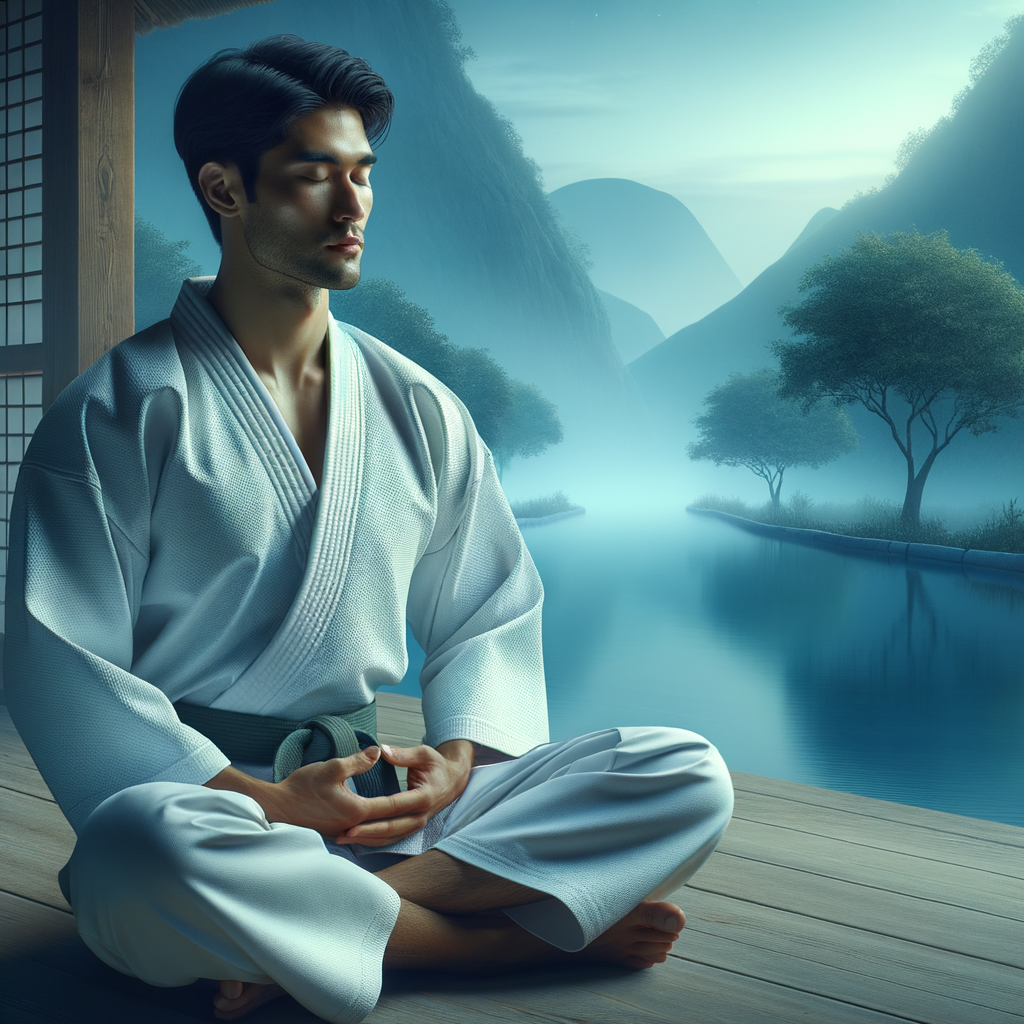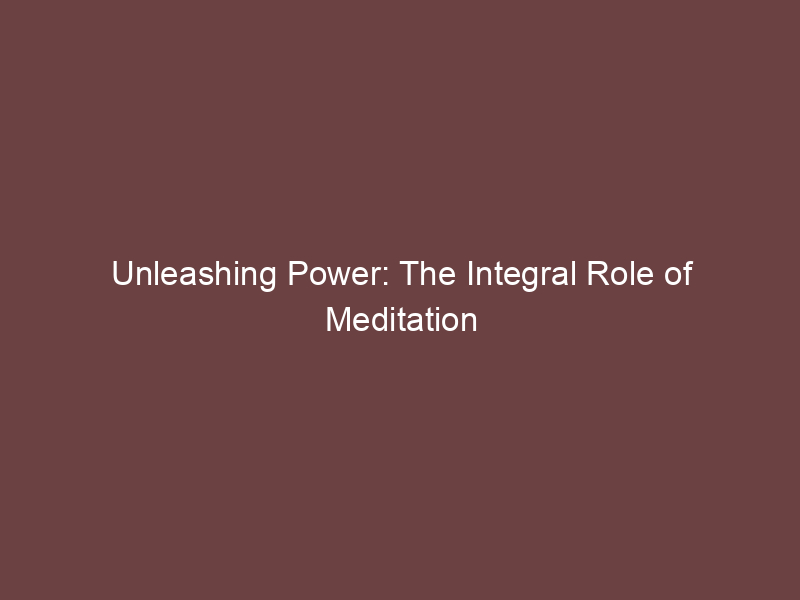
Introduction: The Power of Meditation in Martial Arts
When we think of martial arts like Karate, we often visualize high-energy kicks, punches, and swift movements. However, there’s another crucial component that often goes unnoticed – meditation. This practice is as integral to martial arts as the physical techniques themselves. It’s the secret ingredient that helps martial artists maintain focus, control their emotions, and achieve their full potential.
- Understanding the concept of meditation in martial arts
- Exploring the relationship between Karate and mindfulness
Meditation in martial arts is not just about sitting quietly; it’s a practice of mindfulness, of being present in the moment. It involves focusing your mind, usually on your breath, while letting go of any distracting thoughts. This practice helps martial artists to clear their minds, enhancing their focus and concentration. It’s like sharpening a sword; the more focused the mind, the more effective the martial artist.
Now, let’s delve into the relationship between Karate and mindfulness. Karate is not just a physical discipline; it’s a mental one as well. The practice of Karate requires a high level of concentration and mental discipline. This is where mindfulness comes in. By practicing mindfulness, Karate practitioners can stay focused during their training, improving their performance and technique. It also helps them to stay calm and composed during fights, allowing them to make better decisions and react more quickly.
In conclusion, meditation and mindfulness are powerful tools in the world of martial arts. They help practitioners to sharpen their minds, improve their focus, and enhance their performance. So, the next time you watch a Karate match, remember that the power you see is not just physical, but also mental.
The Role of Meditation in Karate
Meditation plays a significant role in the practice of Karate. It’s not just about physical strength and agility; mental strength is equally important. This is where meditation comes into play. Let’s delve into the benefits of incorporating meditation into Karate.
Benefits of Meditation in Karate
Meditation can bring about a variety of benefits when integrated into Karate training. Here are some of the key advantages:
- Enhanced focus and concentration: Regular meditation can help improve your focus and concentration. It trains your mind to stay in the present moment, which is crucial in Karate. You need to be fully aware of your surroundings and your opponent’s movements.
- Improved physical performance: Meditation can also enhance your physical performance in Karate. It helps in better control of your body movements and increases your endurance. A study conducted by the American College of Sports Medicine found that athletes who meditated for 12 weeks showed significant improvements in their performance.
- Reduced stress and anxiety: Karate is not just about fighting; it’s also about managing your emotions. Meditation can help reduce stress and anxiety, making you more calm and composed during your Karate sessions.
- Increased self-awareness and self-control: Meditation helps in developing self-awareness and self-control. It makes you more aware of your thoughts, emotions, and reactions. This increased self-awareness can help you control your reactions better during a Karate match.
In conclusion, meditation can significantly enhance your Karate performance by improving your focus, physical performance, and emotional control. So, if you’re a Karate enthusiast, consider incorporating meditation into your training routine.
How to Incorporate Meditation into Karate Practice
Integrating meditation into your Karate practice can seem daunting at first, but with a few simple steps, you can begin to experience the benefits of this powerful combination. Here’s how you can start:
-
Beginning with basic meditation techniques
Before you can incorporate meditation into your Karate practice, you need to understand the basics. Start by setting aside a few minutes each day to focus on your breath. Sit in a comfortable position, close your eyes, and take slow, deep breaths. Try to clear your mind and focus only on the sensation of breathing. This simple technique can help you develop the focus and concentration necessary for more advanced meditation practices.
-
Integrating meditation into Karate training sessions
Once you’ve mastered basic meditation techniques, you can start incorporating them into your Karate training. Begin your training sessions with a few minutes of meditation to clear your mind and prepare your body for the physical demands of Karate. You can also use meditation during breaks to refocus and calm your mind. Finally, end your sessions with a few minutes of meditation to help your body recover and to reflect on your training.
-
Practicing mindfulness during Karate drills and exercises
Mindfulness is a form of meditation where you focus your attention on the present moment. During your Karate drills and exercises, try to be fully present and aware of each movement and each breath. This can help you improve your technique, increase your focus, and reduce stress and anxiety.
Remember, incorporating meditation into your Karate practice is a journey, not a destination. Be patient with yourself and enjoy the process of learning and growing.
Exploring Different Meditation Techniques for Karate
In the world of martial arts, meditation plays a crucial role. It helps to improve focus, reduce stress, and enhance performance. Let’s explore some basic meditation techniques that can be beneficial for karate practitioners.
Basic Meditation Techniques
These techniques are simple yet effective, and can be practiced by anyone, regardless of their experience in karate or meditation. Here are three basic meditation techniques that can be incorporated into your karate training:
- Breathing Exercises: This is the foundation of all meditation techniques. It involves focusing on your breath, inhaling and exhaling slowly and deeply. This helps to calm the mind and body, improving concentration and relaxation. It’s a good starting point for beginners in meditation.
- Body Scan Meditation: This technique involves focusing on different parts of the body, starting from the toes and moving up to the head. It helps to increase body awareness, reduce tension and promote relaxation. This can be particularly useful for karate practitioners, as it helps to improve the mind-body connection, which is essential for effective performance.
- Mindfulness Meditation: This involves focusing on the present moment, without judgement. It can be done while sitting quietly or during everyday activities. It helps to reduce stress, improve focus and enhance emotional well-being. This can be beneficial for karate practitioners, as it helps to improve mental clarity and focus, which are crucial for successful performance.
These basic meditation techniques can be a valuable addition to your karate training. They can help to improve your focus, reduce stress, and enhance your performance. So, why not give them a try?
Advanced Meditation Techniques
As we delve deeper into the world of meditation, we encounter advanced techniques that can further enhance focus and mindfulness. These methods, while requiring more practice and understanding, can provide profound benefits for martial artists. Let’s explore three of these advanced techniques: Zen meditation, Transcendental meditation, and Qigong meditation.
-
Zen Meditation
Zen meditation, also known as Zazen, is a form of meditation that originated from Buddhism. It involves sitting in a comfortable position, focusing on your breath, and letting your thoughts flow freely without judgment. This technique encourages a state of alertness and presence, which can significantly improve a karate practitioner’s reaction time and precision.
-
Transcendental Meditation
Transcendental meditation is a technique that involves silently repeating a mantra to yourself. This practice allows the mind to settle into a state of deep relaxation and inner peace. For martial artists, this technique can help reduce stress, improve concentration, and enhance resilience, which are essential traits for any karateka.
-
Qigong Meditation
Qigong meditation is a Chinese technique that combines coordinated movements, deep breathing, and mental focus. This form of meditation is particularly beneficial for martial artists as it not only improves mental clarity but also enhances physical strength and flexibility. Regular practice of Qigong meditation can lead to improved karate techniques and better overall performance.
In conclusion, while these advanced meditation techniques may require more practice and dedication, the benefits they offer to karate practitioners are immense. Whether it’s improving mental clarity with Zen meditation, enhancing concentration with Transcendental meditation, or boosting physical strength with Qigong meditation, these techniques can significantly improve your martial arts journey.
Case Studies: The Impact of Meditation in Karate Training
Let’s delve into some real-life examples that demonstrate the profound impact of meditation on karate training. These case studies will show how mindfulness can enhance performance, aid in injury recovery, and improve mental resilience.
- Case Study 1: Enhancing Performance Through Mindfulness
A group of karate students incorporated mindfulness meditation into their training regimen for a period of six months. The results were astounding. They reported a significant improvement in their focus and precision during practice sessions and competitions. Their coaches also noticed a marked increase in their overall performance and consistency. This case study clearly shows the potential of mindfulness meditation in enhancing karate performance.
- Case Study 2: The Role of Meditation in Injury Recovery
In another instance, a karate practitioner who had sustained a serious injury used meditation as part of his recovery process. By focusing his mind on healing and visualizing the recovery of his injured area, he was able to return to training much quicker than expected. His doctors were amazed by his speedy recovery, attributing it to his regular meditation practice. This case study emphasizes the role of meditation in injury recovery in karate.
- Case Study 3: Improving Mental Resilience with Meditation
Finally, a case study involving a karate school that introduced meditation sessions for its students. The goal was to improve their mental resilience and ability to handle stress during high-pressure situations. After a year, the students who participated in the meditation sessions showed a significant improvement in their ability to stay calm and focused during competitions. They also reported feeling less stressed and more confident. This case study demonstrates how meditation can improve mental resilience in karate practitioners.
These case studies provide compelling evidence of the positive impact of meditation in karate training. Incorporating mindfulness and meditation into your karate training regimen could lead to improved performance, faster recovery from injuries, and enhanced mental resilience.
Conclusion: The Future of Mindfulness in Karate
As we reach the end of our discussion, it becomes clear that mindfulness and meditation are not just passing trends in the world of Karate. They are powerful tools that can enhance training and performance, shaping the future of this martial art. Let’s delve into this further.
- The growing importance of mindfulness in martial arts
Mindfulness, the practice of being fully present and engaged in the moment, is gaining recognition in martial arts, especially Karate. It’s not just about physical strength or technique anymore. The mental aspect of training is being acknowledged as equally important.
According to a study, martial artists who practice mindfulness show improved focus, better decision-making skills, and greater resilience. These are all crucial skills in Karate. As more and more trainers and practitioners understand the benefits of mindfulness, its importance in martial arts is only set to grow.
- How meditation can shape the future of Karate training
Meditation, a key component of mindfulness, is poised to revolutionize Karate training. By incorporating meditation into training routines, Karate practitioners can achieve a state of calm and focus that enhances their performance.
Imagine a Karate class where, before any physical training begins, students sit in silence, meditating. They clear their minds of distractions, focus on their breathing, and visualize their moves. This mental preparation can make a significant difference in their physical performance.
Moreover, meditation can help with stress management, a vital aspect for competitive Karate practitioners. It can also foster a deeper understanding of the Karate philosophy, which goes beyond just fighting techniques.
In conclusion, the future of Karate looks bright with the integration of mindfulness and meditation. As we move forward, these practices will become an integral part of Karate, helping practitioners not only in their martial arts journey but also in their personal growth.






